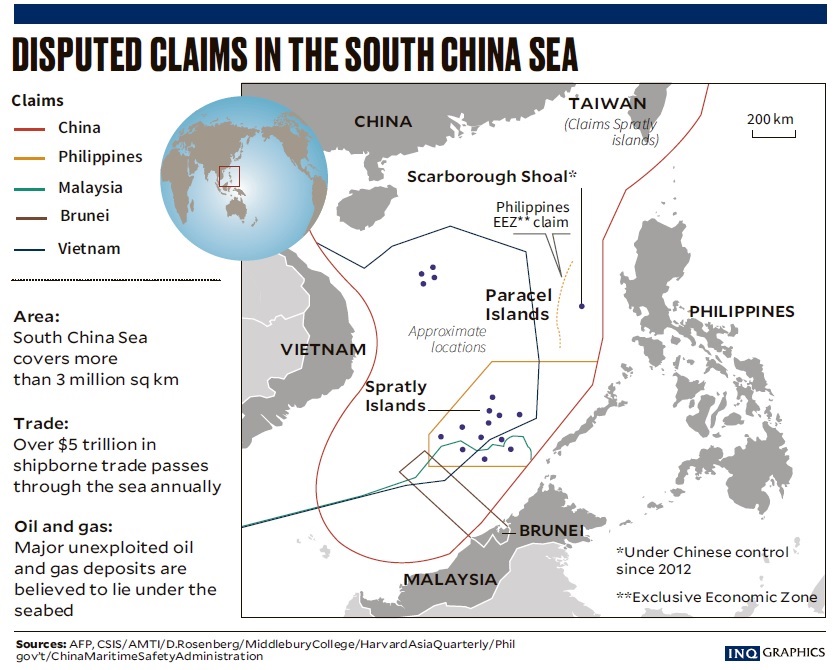China’s radio warnings a daily occurrence – AFP chief
China’s radio warnings to Philippine aircraft and ships in the South China Sea is “a daily occurrence,” but Filipino sailors and pilots still carry on with their patrols, Gen. Carlito Galvez Jr., chief of the Armed Forces of the Philippines (AFP), said in a press briefing in Camp Aguinaldo on Monday.
“It’s a daily occurrence and our pilots just [reply]: We are just doing our routine flight on our jurisdiction and territory,” he told reporters.
Galvez was asked to comment on the recent US Navy patrol over China’s fortified islands in the Spratlys.
BBC, one of the international TV networks represented onboard, was able to pick up China’s warning to a Philippine military aircraft supposedly flying nearby.
“Philippine military aircraft. I’m warning you again: Leave immediately or you will bear responsibility for all the consequences,” a voice which sounded aggressive was heard as saying.
Article continues after this advertisementThe news report observed that the China’s radio warning to the Philippine aircraft was less courteous compared to the US Navy aircraft.
Article continues after this advertisement“We overhear China warning a Philippine aircraft. This time, they are not as nearly as polite,” BBC’s Rupert Wingfield- Hayes said in his report.
The report said the US Navy was warned by China at least five times during the flight. But China appeared to have issued more courteous warnings to the US: “Leave immediately and keep out to avoid any misunderstanding.”
Euan Graham, director of the International Security Program at the Australian-based Lowy Institute, also noted the “striking” difference of China’s approach to the Philippines and US.
“The more menacing tone of PLA [People’s Liberation Army] warning to Philippine aircraft, compared to US aircraft, is striking. Calibrated to intimidate smaller, weaker states?” Graham wrote in his Twitter account.
The US plane flew over four of China’s artificial islands – Kagitingan Reef (Fiery Cross), Zamora Reef (Subi), Panganiban Reef (Mischief), and Mabini Reef (Johnson).
PH flies three times daily
Galvez said they have a plotted route during their routine patrols in the South China Sea and they conduct aerial patrols thrice a day.
“We fly three times a day and China challenges us – and that includes ships,” he said. “Our soldiers, airmen, sailors just continue because we know we are patrolling in our territory.”
He did not comment, however, about China’s “less than polite” radio warnings to the Philippines compared to the US.
China claims most parts of the South China Sea, including waters close to the shores of the Philippines, Brunei, Malaysia and Vietnam.
The ruling on a challenge brought by the Philippines, the United Nations-backed Permanent Court of Arbitration in The Hague invalidated China’s sweeping claim in July 2016.
But the Duterte administration set aside the ruling in exchange for economic opportunities and friendly ties with China.
Early this year, the Inquirer published close-up surveillance images of China’s reclaimed features, which are now equipped with runways, radar towers, missile shelters and other military facilities.
The photos showed that the bases are almost operational and awaiting the deployment of personnel and aircraft.
China insists that the facilities on its man-made islands in the Spratlys are primarily for civilian purposes and that it has “indisputable sovereignty” over the area. /atm
RELATED
PH airs concern over Chinese radio warnings
China threatens PH military aircraft in latest flight over South China Sea
EXCLUSIVE: New photos show China is nearly done with its militarization of South China Sea
For comprehensive coverage, in-depth analysis, visit our special page for West Philippine Sea updates. Stay informed with articles, videos, and expert opinions.
